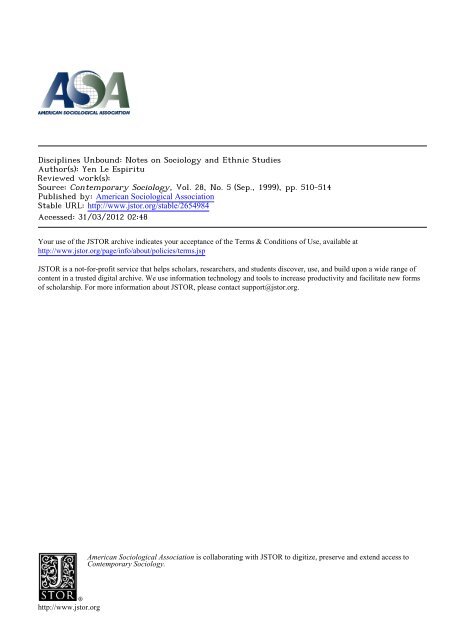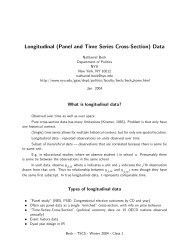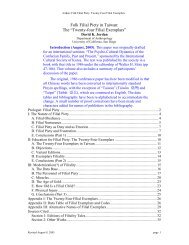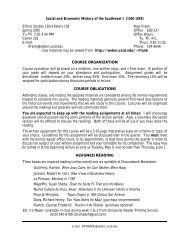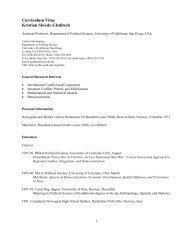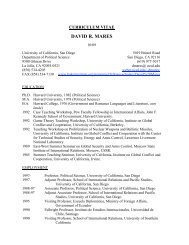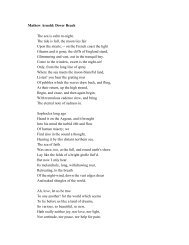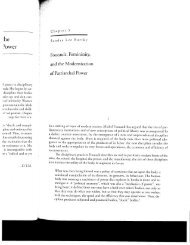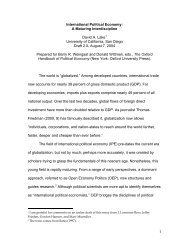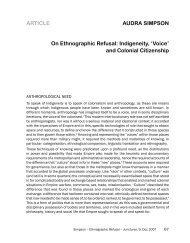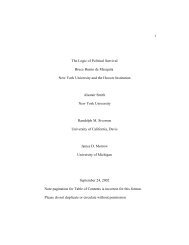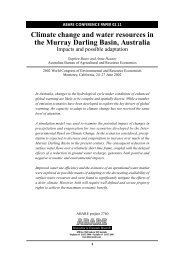Disciplines Unbound: Notes on Sociology and Ethnic Studies
Disciplines Unbound: Notes on Sociology and Ethnic Studies
Disciplines Unbound: Notes on Sociology and Ethnic Studies
You also want an ePaper? Increase the reach of your titles
YUMPU automatically turns print PDFs into web optimized ePapers that Google loves.
<str<strong>on</strong>g>Disciplines</str<strong>on</strong>g> <str<strong>on</strong>g>Unbound</str<strong>on</strong>g>: <str<strong>on</strong>g>Notes</str<strong>on</strong>g> <strong>on</strong> <strong>Sociology</strong> <strong>and</strong> <strong>Ethnic</strong> <strong>Studies</strong><br />
Author(s): Yen Le Espiritu<br />
Reviewed work(s):<br />
Source: C<strong>on</strong>temporary <strong>Sociology</strong>, Vol. 28, No. 5 (Sep., 1999), pp. 510-514<br />
Published by: American Sociological Associati<strong>on</strong><br />
Stable URL: http://www.jstor.org/stable/2654984 .<br />
Accessed: 31/03/2012 02:48<br />
Your use of the JSTOR archive indicates your acceptance of the Terms & C<strong>on</strong>diti<strong>on</strong>s of Use, available at .<br />
http://www.jstor.org/page/info/about/policies/terms.jsp<br />
JSTOR is a not-for-profit service that helps scholars, researchers, <strong>and</strong> students discover, use, <strong>and</strong> build up<strong>on</strong> a wide range of<br />
c<strong>on</strong>tent in a trusted digital archive. We use informati<strong>on</strong> technology <strong>and</strong> tools to increase productivity <strong>and</strong> facilitate new forms<br />
of scholarship. For more informati<strong>on</strong> about JSTOR, please c<strong>on</strong>tact support@jstor.org.<br />
http://www.jstor.org<br />
American Sociological Associati<strong>on</strong> is collaborating with JSTOR to digitize, preserve <strong>and</strong> extend access to<br />
C<strong>on</strong>temporary <strong>Sociology</strong>.
510 Symposia<br />
management is notforevery<strong>on</strong>e. It is acomfort- ideas into management. Since I like moving<br />
able locati<strong>on</strong> <strong>on</strong>ly if you are willing to move between disciplines <strong>and</strong> between theory <strong>and</strong><br />
bey<strong>on</strong>d the boundaries of sociology <strong>and</strong>, at the practice, I wouldn't trade places with any<strong>on</strong>e.<br />
same time, are inclined to bring sociological<br />
<str<strong>on</strong>g>Disciplines</str<strong>on</strong>g> <str<strong>on</strong>g>Unbound</str<strong>on</strong>g>: <str<strong>on</strong>g>Notes</str<strong>on</strong>g> <strong>on</strong> <strong>Sociology</strong> <strong>and</strong> <strong>Ethnic</strong> <strong>Studies</strong><br />
YEN LE ESPIRITU<br />
University of California, San Diego<br />
The new social movements of the 1960s <strong>and</strong> sociology, the Chicago School sociologists spoke<br />
the post-1965 increases in racialized immigrant powerfully to the social issues of industrializati<strong>on</strong><br />
populati<strong>on</strong>s transformed the academy, usher- <strong>and</strong> urbanizati<strong>on</strong> through their attenti<strong>on</strong> to<br />
ing in new subjects of social knowledge as well as everyday experience. In the late 1950s, C.<br />
new critical social knowledges (Seidman 1994). Wright Mills's The Sociological Imaginati<strong>on</strong> advo-<br />
These new subjects posed new questi<strong>on</strong>s, chal- cated a critical social science, urging sociologists<br />
lenged the dominant paradigms of academic dis- to commit themselves to an activist critique <strong>and</strong><br />
ciplines, <strong>and</strong> c<strong>on</strong>tested the separati<strong>on</strong> of rec<strong>on</strong>structi<strong>on</strong> of society. But there were also<br />
knowledge <strong>and</strong> politics. The new critical knowl- prominent countertrends; in particular, during<br />
edge seeped into the traditi<strong>on</strong>al disciplines, but the postwar decades, the growth of the research<br />
took full shape in the emerging interdisciplinary university <strong>and</strong> of funding sources for the social<br />
fields of <strong>Ethnic</strong> <strong>Studies</strong>, Women's <strong>Studies</strong>, Third sciences "scientized" sociology (L<strong>on</strong>g 1997:<br />
World <strong>Studies</strong>, Cultural <strong>Studies</strong>, <strong>and</strong> Queer 9-10). Anchored in positivist epistemologies,<br />
<strong>Studies</strong>. It was amid this changing intellectual the disciplinary mainstream of sociology became<br />
<strong>and</strong> political milieu that I entered the United increasingly more specialized <strong>and</strong> corresp<strong>on</strong>d-<br />
States <strong>and</strong> eventually the university. Arriving ingly less engaged with related disciplines; its<br />
from Vietnam in 1975 <strong>and</strong> entering higher edu- claim to universal <strong>and</strong> objective knowledge also<br />
cati<strong>on</strong> in the early 1980s, I inherited a more moved the field away from an explicit commit-<br />
democratized <strong>and</strong> diversified university <strong>and</strong> a ment to social activism (Sprague 1998).<br />
more critical <strong>and</strong> politicized body of social Paradoxically, even as sociologists wrestled<br />
knowledge. By the time I began graduate school with issues of power, c<strong>on</strong>flict, <strong>and</strong> inequality,<br />
in the mid-1980s, I had come to view the uni- they have largely neglected or subordinated race<br />
versity as a potentially important site for <strong>and</strong> thus have missed the manner in which race<br />
activism a site to generate critical social has been "a fundamental axis of social organiza-<br />
knowledge <strong>and</strong> practices aimed at social change. ti<strong>on</strong> in the U. S." (Omi <strong>and</strong> Winant 1994: 13).<br />
Focusing my scholarship <strong>on</strong> comparative race The great social theorists of the nineteenth cen-<br />
<strong>and</strong> ethnic relati<strong>on</strong>s, I received my graduate tury all predicted that race <strong>and</strong> ethnicity c<strong>on</strong>-<br />
training in sociology but have worked since then ceptualized as remnants of a preindustrial<br />
in the interdisciplinary field of <strong>Ethnic</strong> <strong>Studies</strong>. It order would decline in significance in modern<br />
is the relati<strong>on</strong>ship between sociology <strong>and</strong> <strong>Ethnic</strong> society. For example, the classical Marxist<br />
<strong>Studies</strong> both the gaps <strong>and</strong> the overlaps that I underst<strong>and</strong>ing that capital seeks "abstract labor"<br />
will attempt to sketch in this brief essay. overlooks the ways in which capital has profited<br />
At its best, sociology grapples seriously <strong>and</strong> precisely from the "flexible" racializati<strong>on</strong> <strong>and</strong><br />
effectively with issues of social inequality, pow- gendering of labor. In the United States, before<br />
er, <strong>and</strong> collective acti<strong>on</strong>. From its incepti<strong>on</strong>, the 1 960s, much of the sociology of race<br />
sociology has asked difficult questi<strong>on</strong>s about expressed assimilati<strong>on</strong>ist principles <strong>and</strong> predict-<br />
important social issues <strong>and</strong> believed that it could ed that with each succeeding generati<strong>on</strong>, U.S.<br />
inform social acti<strong>on</strong> in answering them. The ethnic groups would improve their ec<strong>on</strong>omic<br />
founding sociologists Marx, Weber, Durk- status <strong>and</strong> become progressively more similar to<br />
heim, Simmel, <strong>and</strong> others all resp<strong>on</strong>ded to the the "majority culture" (Park 1950; Gord<strong>on</strong><br />
crises of emerging industrial capitalism <strong>and</strong> 1964). Developed to explain the experiences of<br />
intended to shape the course of historical events European immigrants <strong>and</strong> their children, this<br />
through their social theories. Within American assimilati<strong>on</strong>ist framework did not differentiate
Syrnposia 511<br />
between the experiences of racialized minorities the complex roles played by race <strong>and</strong> ethnicity<br />
<strong>and</strong> those of white ethnic groups, <strong>and</strong> therefore in social relati<strong>on</strong>s as a way to produce new epis<br />
could not account for the enduring <strong>and</strong> specific temologies <strong>and</strong> new data <strong>on</strong> social power, social<br />
ways in which race as manifested in c<strong>on</strong>quest, instituti<strong>on</strong>s, <strong>and</strong> social identities.<br />
genocide, slavery, <strong>and</strong> immigrati<strong>on</strong> has been The early <strong>Ethnic</strong> <strong>Studies</strong> scholarship <strong>and</strong><br />
ingrained in the nati<strong>on</strong>'s social structure <strong>and</strong> programs were intensely nati<strong>on</strong>alistic. Writing<br />
culture.<br />
from an anti-assimilati<strong>on</strong>ist stance, many schol-<br />
The social upheavals <strong>and</strong> minority move- ars sought to unearth a "buried past," to chr<strong>on</strong>iments<br />
of the 1960s underscored the centrality of cle traditi<strong>on</strong>s of protest <strong>and</strong> resistance, <strong>and</strong> to<br />
race in American life <strong>and</strong> shattered the myth of establish that racialized populati<strong>on</strong>s have been<br />
the inevitability <strong>and</strong> even the desirability of absolutely crucial to the making of history.<br />
assimilati<strong>on</strong>. Race relati<strong>on</strong>s al<strong>on</strong>g with pover- Though important, this cultural nati<strong>on</strong>alist<br />
ty, gender, <strong>and</strong> sexuality surfaced as an urgent paradigm tended to homogenize differences,<br />
social problem. Sociologists varied in their assuming heterosexuality <strong>and</strong> subordinating<br />
resp<strong>on</strong>ses. Some sought to uncover <strong>and</strong> fill gaps issues of gender <strong>and</strong> social class. For example,<br />
in sociological knowledge by documenting the early Asian-American cultural nati<strong>on</strong>alism puraccomplishments<br />
<strong>and</strong> c<strong>on</strong>tributi<strong>on</strong>s of previous- sued an aggressively masculinist agenda "to chally<br />
unstudied <strong>and</strong> uncelebrated individuals <strong>and</strong> lenge the met<strong>on</strong>ymic equati<strong>on</strong> of Asian with the<br />
groups. Others began to incorporate race into feminine" (Yanagisako 1995: 287). C<strong>on</strong>fr<strong>on</strong>ted<br />
their research, but as a mere variable or as a with a history of painful "emasculati<strong>on</strong>," these<br />
source of research rather than as a central theo- male writers took whites to task for their racist<br />
retical c<strong>on</strong>cept. Still others c<strong>on</strong>ceptualized race myths, but were often blind to their own accepas<br />
a "problem" to be managed <strong>and</strong> to get bey<strong>on</strong>d. tance of the racialized patriarchal c<strong>on</strong>struct of<br />
C<strong>on</strong>ceptualized primarily in terms of difference, gender stereotypes (Cheung 1990: 236-37). The<br />
race remains a subordinate comp<strong>on</strong>ent of broad- focus <strong>on</strong> individual groups also obscured the<br />
er <strong>and</strong> supposedly more important social rela- ways in which racialized ethnicity is relati<strong>on</strong>al<br />
ti<strong>on</strong>ships, especially class. By treating race as a rather than atomized <strong>and</strong> discrete, <strong>and</strong> the ways<br />
property of individuals instead of a principle of in which group identities necessarily form<br />
social organizati<strong>on</strong>, sociologists saw "difference" through interacti<strong>on</strong> with other groups through<br />
but failed to "see differently." In other words, the complicated experiences of c<strong>on</strong>flict <strong>and</strong> cooperinclusi<strong>on</strong><br />
of race in sociology has most often ati<strong>on</strong> <strong>and</strong> in structural c<strong>on</strong>texts of power.<br />
been additive, not transformative.<br />
But racialized groups are heterogeneous; their<br />
The <strong>Ethnic</strong> <strong>Studies</strong> resp<strong>on</strong>se was different. cultures are varied <strong>and</strong> unfixed; their group<br />
Emerging from the student <strong>and</strong> community boundaries are unstable <strong>and</strong> changeable; <strong>and</strong><br />
grassroots movements of the late 1960s <strong>and</strong> ear- their identities are marked with identities of<br />
ly 1970s, <strong>Ethnic</strong> <strong>Studies</strong> claimed the academy as gender, sexual preference, class, <strong>and</strong> religi<strong>on</strong>.<br />
<strong>on</strong>e site of struggles over culture, educati<strong>on</strong>, <strong>and</strong> These complex realities the products of<br />
citizenship (Lowe 1996: 37). Explicitly critical uneven histories <strong>and</strong> unequal power relati<strong>on</strong>s<strong>and</strong><br />
oppositi<strong>on</strong>al, this scholarship c<strong>on</strong>demned challenge the binaries implicit in the cultural<br />
the producti<strong>on</strong> of"objective" <strong>and</strong> "universal" nati<strong>on</strong>alist paradigm, <strong>and</strong> they dem<strong>and</strong> that<br />
knowledge that misinterprets, misinforms, <strong>and</strong> <strong>Ethnic</strong> <strong>Studies</strong> scholars pay attenti<strong>on</strong> to the<br />
erases the histories, experiences, <strong>and</strong> acti<strong>on</strong>s of complicated, c<strong>on</strong>flicted, <strong>and</strong> composite nature<br />
racialized groups; <strong>and</strong> it dem<strong>and</strong>ed more inclu- of all social identities, particularly to the insepasive,<br />
situated, <strong>and</strong> transformative knowledge. rability <strong>and</strong> mutually c<strong>on</strong>stitutive realities of<br />
The <strong>Ethnic</strong> <strong>Studies</strong> critiques of socially sanc- race, class, gender, <strong>and</strong> sexuality. For example,<br />
ti<strong>on</strong>ed forms of knowledge echo those raised by writing from <strong>and</strong> about the realities <strong>and</strong> comsociologists<br />
of knowledge: Both call attenti<strong>on</strong> to plexities of living <strong>on</strong> the borderl<strong>and</strong>s, Gloria<br />
the ways in which struggles over the producti<strong>on</strong> Anzaldua (1987) insists <strong>on</strong> the interc<strong>on</strong>nectedof<br />
knowledge over meanings, ways of assessing ness <strong>and</strong> simultaneity of the often c<strong>on</strong>tradictory<br />
"truths," <strong>and</strong> c<strong>on</strong>trol of discursive producti<strong>on</strong> aspects of her gender, ethnicity, class, sexuality,<br />
<strong>and</strong> authorizati<strong>on</strong> are intimately c<strong>on</strong>nected to <strong>and</strong> feminist politics. Calling attenti<strong>on</strong> to the<br />
struggles over the (re)producti<strong>on</strong> of power <strong>and</strong> interc<strong>on</strong>necti<strong>on</strong>s between patriarchy <strong>and</strong> the<br />
inequality. However, the primary intellectual racialized capitalist state, Ch<strong>and</strong>ra Mohanty<br />
goal of <strong>Ethnic</strong> <strong>Studies</strong> is specific: to investigate (1991) argues that the definiti<strong>on</strong> of citizenship is
512 Symposia<br />
always a gendered <strong>and</strong> racial formati<strong>on</strong>. talism. In another instance, Rosa Linda Fregoso<br />
Similarly, George Lipsitz (1994) c<strong>on</strong>tends that (1994) shows how culture functi<strong>on</strong>s as a social<br />
the rise of identity movements during the 1940s force by documenting how gendered images <strong>and</strong><br />
reflected how class came to be increasingly lived ideas in cultural products <strong>and</strong> practices serve as<br />
<strong>and</strong> experienced through race <strong>and</strong> gender. The impetus for the development of a Chicana femirecent<br />
scholarship in <strong>Ethnic</strong> <strong>Studies</strong> also calls nist politics of "differential c<strong>on</strong>sciousness." This<br />
attenti<strong>on</strong> to the ways in which new social rela- interdisciplinarity is not <strong>on</strong>ly methodological or<br />
ti<strong>on</strong>s have produced new coaliti<strong>on</strong>s <strong>and</strong> c<strong>on</strong>flicts theoretical; it is also a resp<strong>on</strong>se to the inadequathat<br />
transform the meaning of racial <strong>and</strong> ethnic cy of self-c<strong>on</strong>tained disciplines particularly the<br />
identity. For example, Lisa Lowe (1996) shows universalizing models of social analysis to<br />
how the current global restructuring particu- address the new <strong>and</strong> complex c<strong>on</strong>necti<strong>on</strong>s<br />
larly the internati<strong>on</strong>alizati<strong>on</strong> <strong>and</strong> feminizati<strong>on</strong> between culture <strong>and</strong> social structure engendered<br />
of labor forces-c<strong>on</strong>stitutes a shift in the mode by a new global c<strong>on</strong>text, new communicati<strong>on</strong>s<br />
of producti<strong>on</strong> that now necessitates alliances technologies, <strong>and</strong> new transnati<strong>on</strong>al social relabetween<br />
racialized <strong>and</strong> Third World women ti<strong>on</strong>s (Lipsitz 1997; Basch, Schiller, <strong>and</strong> Blanc<br />
within, outside, <strong>and</strong> across the border of the 1994).<br />
United states. In sum, most of the best work in The critical social knowledge produced by<br />
<strong>Ethnic</strong> <strong>Studies</strong> views ethnicity as corljurlCtural, as <strong>Ethnic</strong> <strong>Studies</strong> <strong>and</strong> related interdisciplinary<br />
a "product of intersubjectivity <strong>and</strong> interacti<strong>on</strong> in studies left the barest traces <strong>on</strong> sociology until<br />
c<strong>on</strong>crete historical <strong>and</strong> social circumstances" the 1980s. The publicati<strong>on</strong> of Michael Omi <strong>and</strong><br />
(<strong>Ethnic</strong> <strong>Studies</strong> Department 1994).<br />
Howard Winant's Racial Formatiorl irl the Urlited<br />
Perhaps most important, the most exciting States in 1986 (republished in 1994) was groundwork<br />
in <strong>Ethnic</strong> <strong>Studies</strong> is relentlessly interdisci- breaking. Emphasizing the socially c<strong>on</strong>structed<br />
plinary <strong>and</strong> multidisciplinary. Born amid the nature of race, Omi <strong>and</strong> Winant insist that race<br />
radical flux <strong>and</strong> rec<strong>on</strong>figurati<strong>on</strong>s of knowledge <strong>and</strong> racial logic are ubiquitous, determining<br />
within the academy, <strong>Ethnic</strong> <strong>Studies</strong> owes its <strong>on</strong>e's political rights, <strong>on</strong>e's locati<strong>on</strong> in the labor<br />
existence to the development of interdiscipli- market, <strong>and</strong> <strong>on</strong>e's sense of identity. Perhaps<br />
rlary trends within traditi<strong>on</strong>al disciplines, to the most important, the authors link cultural expresestablishment<br />
of new interdisciplinary studies, as si<strong>on</strong>s with social structure by defining race as "a<br />
well as to the growing dialogue across disci- matter of both social structure <strong>and</strong> cultural repplines.<br />
Drawing from the best work in the resentati<strong>on</strong>" (1994: 56). Subsequent studies of<br />
humanities <strong>and</strong> social sciences <strong>and</strong> from the bur- race in sociology have both drawn from <strong>and</strong><br />
ge<strong>on</strong>ing theoretical <strong>and</strong> methodological innova- exp<strong>and</strong>ed <strong>on</strong> Omi <strong>and</strong> Winant's influential<br />
ti<strong>on</strong>s in Feminist <strong>Studies</strong>, Queer <strong>Studies</strong>, racial formati<strong>on</strong> perspective. For example, in a<br />
Postcol<strong>on</strong>ial <strong>Studies</strong>, Cultural <strong>Studies</strong>, <strong>and</strong> study of multicultural <strong>and</strong> multiracial California<br />
Communicati<strong>on</strong> <strong>Studies</strong>, <strong>Ethnic</strong> <strong>Studies</strong> schol- during the last half of the nineteenth century,<br />
ars c<strong>on</strong>ceptualize race <strong>and</strong> ethnicity as an ele- Tomas Almaguer (1994) skillfully traces the<br />
ment of both social structure <strong>and</strong> culture. "racial formati<strong>on</strong>" of Anglos, Mexicans, Indians,<br />
Noting the mutually c<strong>on</strong>stitutive qualities of Chinese, <strong>and</strong> Japanese populati<strong>on</strong>s by denoting<br />
cultural forms <strong>and</strong> social structures, <strong>Ethnic</strong> how race is mutually determined by structural<br />
<strong>Studies</strong> scholars delineate the role of race in the <strong>and</strong> ideological factors. In her pivotal study<br />
cognitive mapping of U.S. culture, emphasize Black Femirlist Thought ( 1 99 1 ), Patricia Hill<br />
the oppositi<strong>on</strong>al cultural practices am<strong>on</strong>g Collins argues that ideological representati<strong>on</strong>s of<br />
aggrieved groups, <strong>and</strong> examine how the cultural gender <strong>and</strong> sexuality are central in exercising<br />
symbols generated by the dominant group seem <strong>and</strong> maintaining racial, patriarchal, <strong>and</strong> class<br />
to justify the ec<strong>on</strong>omic exploitati<strong>on</strong> <strong>and</strong> social dominati<strong>on</strong>. N<strong>on</strong>sociologists have also been<br />
oppressi<strong>on</strong> of racialized populati<strong>on</strong>s over time. influenced by the racial formati<strong>on</strong> perspective.<br />
In an innovative study of Asian-American For example, in an impressive study of Asianwomen<br />
as a problem of knowledge, Laura Hyun American cultural politics, literary theorist Lisa<br />
Yi Kang (1997) traces the complex c<strong>on</strong>necti<strong>on</strong>s Lowe (1996) traces the genealogy of a distinct<br />
linking the discursive producti<strong>on</strong> <strong>and</strong> circula- "racial formati<strong>on</strong>" of Asian Americans through<br />
ti<strong>on</strong> of Asian-American women as transnati<strong>on</strong>- the history of the legislati<strong>on</strong> of the Asian as<br />
al labor with the actual physical labor performed alien <strong>and</strong> the administrati<strong>on</strong> of the Asian<br />
by these women in globalized, militarized capi- American as citizen.
Symposia 513<br />
As a sociologist who works in <strong>Ethnic</strong> <strong>Studies</strong>, Anzaldua, Gloria. 1987. Borderl<strong>and</strong>s/La Fr<strong>on</strong>tera. San<br />
I draw from both disciplines. From sociology, I Francisco: Spinsters/Aunt Lute.<br />
learn to be attentive to lived social experience, Basch, Linda, Nina Glick Schiller, <strong>and</strong> Cristina<br />
to grasp the social c<strong>on</strong>structi<strong>on</strong>s of social reality, Szant<strong>on</strong> Blanc. 1994. Nati<strong>on</strong>s <str<strong>on</strong>g>Unbound</str<strong>on</strong>g>:<br />
Transnati<strong>on</strong>al Projects, Postcol<strong>on</strong>ial Predicaments,<br />
<strong>and</strong> to link the study of individual lives with<br />
<strong>and</strong> Deterritorialized Nati<strong>on</strong> States. Langhorne, PA:<br />
broader issues of political ec<strong>on</strong>omy.<br />
Gord<strong>on</strong> & Breach.<br />
But I am excited <strong>and</strong> challenged by <strong>Ethnic</strong> Cheung, King-Kok. 1990. "The NVoman NVarrior<br />
<strong>Studies</strong>' aggressive theoretical <strong>and</strong> empirical Versus the Chinaman Pacific: Must a Chinese<br />
engagement with the reality <strong>and</strong> complexity of American Critic Choose Between Feminism <strong>and</strong><br />
race, by its insistence that knowledge is always Heroism?" Pp. 234-51 in C<strong>on</strong>flicts in Feminism,<br />
partial <strong>and</strong> situated in relati<strong>on</strong>ship to power, <strong>and</strong> edited by M. Hirsch <strong>and</strong> E. F. Keller. New York:<br />
by its explicit interdisciplinarity. These c<strong>on</strong>cep- Routledge.<br />
tual <strong>and</strong> methodological frames provide me with Collins, Patricia Hill. 1991. Black Feminist Thought:<br />
alternative ways of gaining knowledge about the Knowledge, C<strong>on</strong>sciousness, <strong>and</strong> the Politics of<br />
Empowerment. New York: Routledge.<br />
world that better reflect my experience as a<br />
1998. "On Book Exhibits <strong>and</strong> New<br />
racialized immigrant woman. This is not to say Complexities: Reflecti<strong>on</strong>s <strong>on</strong> <strong>Sociology</strong> as<br />
that sociologists have not produced important, Science." C<strong>on</strong>temporary <strong>Sociology</strong> 27: 7-11.<br />
even indispensable scholarship <strong>on</strong> race. To the <strong>Ethnic</strong> <strong>Studies</strong> Department. 1994. "A Proposal for a<br />
c<strong>on</strong>trary, sociological theory <strong>and</strong> research <strong>on</strong> Program of Graduate <strong>Studies</strong> in <strong>Ethnic</strong> <strong>Studies</strong> for<br />
race have grown exp<strong>on</strong>entially, producing an the M.A. <strong>and</strong> Ph.D. Degrees." University of<br />
enormous body of critical studies <strong>on</strong> the issues of California, San Diego.<br />
social difference, social c<strong>on</strong>flict, <strong>and</strong> social Gord<strong>on</strong>, Milt<strong>on</strong>. 1964. Assimilati<strong>on</strong> in American Life:<br />
change. But it is to say that the instituti<strong>on</strong> of soci- The Role of Race, Religi<strong>on</strong>, <strong>and</strong> Nati<strong>on</strong>al Origm.<br />
ology c<strong>on</strong>tinues to resist change.<br />
New York: Oxford University Press.<br />
Fregoso, Rosa Linda. 1994. The Br<strong>on</strong>ze ScreerL .<br />
Even as race was incorporated into individual<br />
Minneapolis: University of Minnesota Press.<br />
research projects, no corresp<strong>on</strong>ding change has Kang, Laura Hyun Yi. 1997. "Si(gh)ting<br />
been made in the discipline's c<strong>on</strong>cepts, theories, Asian/American Tomen as Transnati<strong>on</strong>al Labor."<br />
methods, <strong>and</strong> epistemologies. C<strong>on</strong>sequently, the Positi<strong>on</strong>s 5: 403-37.<br />
racial paradigm, which positi<strong>on</strong>s race as a promi- Lipsitz, George. 1994. Rainbow at Midnight: Labor <strong>and</strong><br />
nent social category creating hierarchies of dif- Culture in the 1 940s. Urbana: University of Illinois<br />
ference in society, remains a minority positi<strong>on</strong> Press.<br />
within mainstream sociological paradigms. Like . 1997. "Facing Up to NVhat's Killing Us:<br />
Patricia Hill Collins (1998), I suspect that this Artistic Practice <strong>and</strong> Grassroots Social Theory."<br />
resistance has something to do with sociologists' Pp. 234-261 in From <strong>Sociology</strong> to Cultural <strong>Studies</strong>,<br />
edited by Elizabeth L<strong>on</strong>g. Oxford: Blackwell.<br />
efforts to guard disciplinary borders <strong>and</strong> in turn<br />
L<strong>on</strong>g, Elizabeth. 1997. "Engaging <strong>Sociology</strong> <strong>and</strong><br />
to protect their assigned places in the natural- Cultural <strong>Studies</strong>: Disciplinarity <strong>and</strong> Social<br />
ized sociological hierarchy. But in an era of glob- Change." Pp. 1-32 in From <strong>Sociology</strong> to Cultural<br />
alizati<strong>on</strong>, new technologies, <strong>and</strong> paradigm shifts, <strong>Studies</strong>, edited by Elizabeth L<strong>on</strong>g. Oxford:<br />
the boundaries of sociology c<strong>on</strong>tinue to be "ever Blackwell.<br />
more slippery" (L<strong>on</strong>g 1997: 12) as sociologists- Lowe, Lisa. 1996. Immigrant Acts: On Asian American<br />
especially graduate students <strong>and</strong> young faculty- Cultural Politics. Durham, NC: Duke University<br />
stretch bey<strong>on</strong>d sociology for other c<strong>on</strong>ceptual Press.<br />
frames more fully to gain knowledge about their Mills, C. NVright. 1959. The Sociological Imaginati<strong>on</strong>.<br />
world. If the goal of our scholarship is to better New York: Oxford University Press.<br />
Mohanty, Ch<strong>and</strong>ra. 1991. "Cartographies of Struggle:<br />
underst<strong>and</strong> <strong>and</strong> thus better build a more just <strong>and</strong><br />
Third NVorld NVomen <strong>and</strong> the Politics of<br />
humane social order, then it seems imperative Feminism." Pp. 1-47 in Third World Women <strong>and</strong><br />
that we learn from as many areas of academic the Politics of Feminism, edited by Ch<strong>and</strong>ra<br />
expertise as possible. A good place to start is to Mohanty, Ann Russo, <strong>and</strong> Lourdes Torres.<br />
establish dialogue across disciplines, beginning Bloomingt<strong>on</strong>: University of Indiana Press.<br />
with sociology <strong>and</strong> <strong>Ethnic</strong> <strong>Studies</strong>.<br />
Omi, Michael <strong>and</strong> Howard Winant. 1986. Racial<br />
Formati<strong>on</strong> in the United States. New York &<br />
References<br />
L<strong>on</strong>d<strong>on</strong>: Routledge.<br />
Almaguer, Tomas. 1994. Racial Fault Lines: The . 1994. Racial Formati<strong>on</strong> in the United States<br />
Historical Origins of White Supremacy in California. From the 1960s to the 1990s. 2d Ed. NewYork &<br />
Berkeley: University of California Press.<br />
L<strong>on</strong>d<strong>on</strong>: Routledge.
514 Symposia<br />
Park, Robert E. 1950. Race <strong>and</strong> Culture. Glencoe, IL: Yanagisako, Sylvia. 1987. "Transforming Orientalism:<br />
Free Press.<br />
Gender, Nati<strong>on</strong>ality, <strong>and</strong> Class in Asian American<br />
Seidman, Steven. 1994. C<strong>on</strong>tested Knowledge: Social <strong>Studies</strong>." Pp. 275-98 in Naturalizing Power: Essays<br />
Theory in the Postmodern Era. Oxford: Blackwell. in Feminist Cultural Analysis, edited by Sylvia<br />
Sprague, Joey. 1998. "(Re)Making <strong>Sociology</strong>: Yanagasiko <strong>and</strong> C. Delaney. New York: Routledge.<br />
Breaking the B<strong>on</strong>ds of Our Discipline."<br />
C<strong>on</strong>temporary <strong>Sociology</strong> 27: 24-28.<br />
A Gray Z<strong>on</strong>e? Meetings between <strong>Sociology</strong> <strong>and</strong> Ger<strong>on</strong>tology<br />
GUNHILD 0. HAGESTAD<br />
Northwestern University <strong>and</strong> Agder College, Norway<br />
It is nearly impossible to discuss the border lectual c<strong>on</strong>cerns in sociology could be pursued in<br />
between sociology <strong>and</strong> ger<strong>on</strong>tology without c<strong>on</strong>- ger<strong>on</strong>tology, through well-anchored questi<strong>on</strong>s<br />
sidering several disciplines. While some people about how age is related to social integrati<strong>on</strong>,<br />
would disagree with me, I do not c<strong>on</strong>sider ger<strong>on</strong>- social differentiati<strong>on</strong>, <strong>and</strong> the creati<strong>on</strong> of mean-<br />
tology a discipline. Rather, I see it as a field of ing. Ger<strong>on</strong>tology would also seem to allow for<br />
inquiry in which a number of disciplines address theoretical <strong>and</strong> methodological explorati<strong>on</strong>s of<br />
questi<strong>on</strong>s related to aging <strong>and</strong> old age. Thus, micro-macro c<strong>on</strong>necti<strong>on</strong>s. In her ASA<br />
when we c<strong>on</strong>sider sociologists who have partici- Presidential Address, Matilda Riley (1987) gave<br />
pated in this field, we ask how they have c<strong>on</strong>- us a powerful reminder that age is <strong>and</strong> should be<br />
tributed to <strong>and</strong> have been affected by its significant in sociology. Yet, about the same<br />
discourse. Ger<strong>on</strong>tology, with etymological roots time, a group of British colleagues argued that:<br />
in the Greek ger- (to grow old) <strong>and</strong> ger<strong>on</strong> (an old<br />
pers<strong>on</strong>) (Achenbaum <strong>and</strong> Levin 1989), brings<br />
Any sociologist working <strong>on</strong> old age (in<br />
together questi<strong>on</strong>s, theoretical perspectives, <strong>and</strong><br />
Engl<strong>and</strong> at least) knows self-evidently how<br />
marginal the subject has been to sociology as<br />
methodological preferences from various disci-<br />
plines, ranging from biology <strong>and</strong> medicine to<br />
a whole <strong>and</strong> how under-represented has<br />
been the sociological perspective within the<br />
psychology <strong>and</strong> sociology. Very often, as<br />
c<strong>on</strong>glomerati<strong>on</strong> of disciplines working under<br />
Achenbaum <strong>and</strong> Levin point out, attempts to<br />
the umbrella of social ger<strong>on</strong>tology. (Fennel,<br />
define ger<strong>on</strong>tology have used the word problem.<br />
The field has experienced fairly c<strong>on</strong>tinuous ten-<br />
Phillips<strong>on</strong>, <strong>and</strong> Evers 1988: 170)<br />
si<strong>on</strong> between two goals: building scientific To begin thinking about the meeting ground<br />
underst<strong>and</strong>ing versus seeking to ameliorate between sociology <strong>and</strong> ger<strong>on</strong>tology, I c<strong>on</strong>tacted<br />
problems associated with individual <strong>and</strong> popula- a number of colleagues in North America <strong>and</strong><br />
ti<strong>on</strong> aging. This tensi<strong>on</strong> is important in the rela- Europe who have been active in the field of<br />
ti<strong>on</strong>ships between sociology <strong>and</strong> ger<strong>on</strong>tology. aging. I asked them when the border started to<br />
L<strong>on</strong>g before ger<strong>on</strong>tology was a field of exist, who the early key actors were, how sociol-<br />
inquiry, classics in the social sciences included ogy <strong>and</strong> ger<strong>on</strong>tology might have mutually influ-<br />
c<strong>on</strong>siderati<strong>on</strong>s of age <strong>and</strong> social structure. For enced each other, <strong>and</strong> what might c<strong>on</strong>stitute<br />
example, Comte p<strong>on</strong>dered progress <strong>and</strong> how it unrealized potentials for cross-fertilizati<strong>on</strong>.<br />
might be linked to generati<strong>on</strong>al successi<strong>on</strong> <strong>and</strong> Although the word gerorltology was in use ear-<br />
the average length of life. Marx <strong>and</strong> Engels c<strong>on</strong>- ly in this century, a series of new instituti<strong>on</strong>s,<br />
sidered how industrializati<strong>on</strong> would affect the such as associati<strong>on</strong>s <strong>and</strong> journals using the name,<br />
significance of age <strong>and</strong> gender. Durkheim arose shortly after World War II. It is therefore<br />
explored c<strong>on</strong>necti<strong>on</strong>s between age <strong>and</strong> social not surprising that when I asked colleagues how<br />
integrati<strong>on</strong>. Early in the twentieth century, far back they would trace interc<strong>on</strong>necti<strong>on</strong>s, the<br />
Mannheim gave us his influential essay <strong>on</strong> how 1940s was the earliest point. Nearly all of them<br />
age places individuals in the flow of history, <strong>and</strong> menti<strong>on</strong>ed Talcott Pars<strong>on</strong>s, often also anthropol-<br />
generati<strong>on</strong>al units c<strong>on</strong>stitute a social locati<strong>on</strong>, ogist Ralph Lint<strong>on</strong>. Both Pars<strong>on</strong>s <strong>and</strong> Lint<strong>on</strong><br />
with subjective awareness of such locati<strong>on</strong>. It published essays <strong>on</strong> age <strong>and</strong> sex as bases of social<br />
would seem reas<strong>on</strong>able that l<strong>on</strong>g-st<strong>and</strong>ing intel- roles in the 1942 volume of Americarl Sociological


